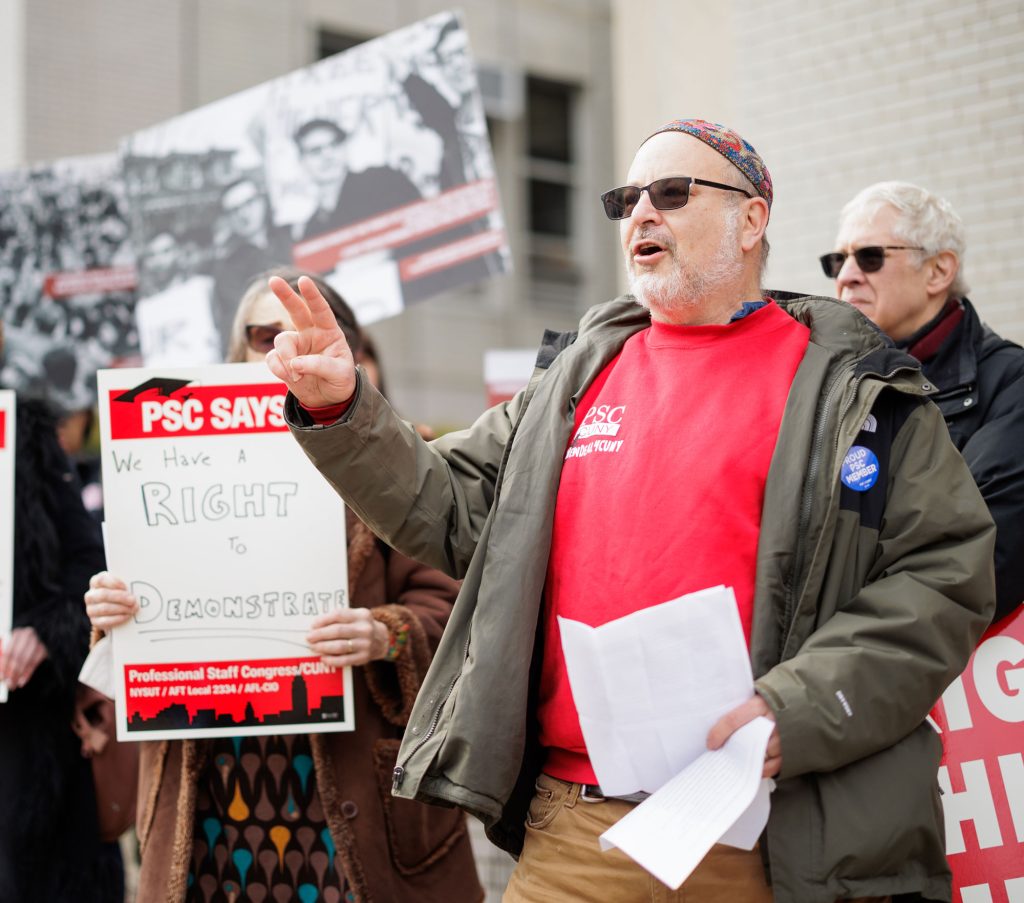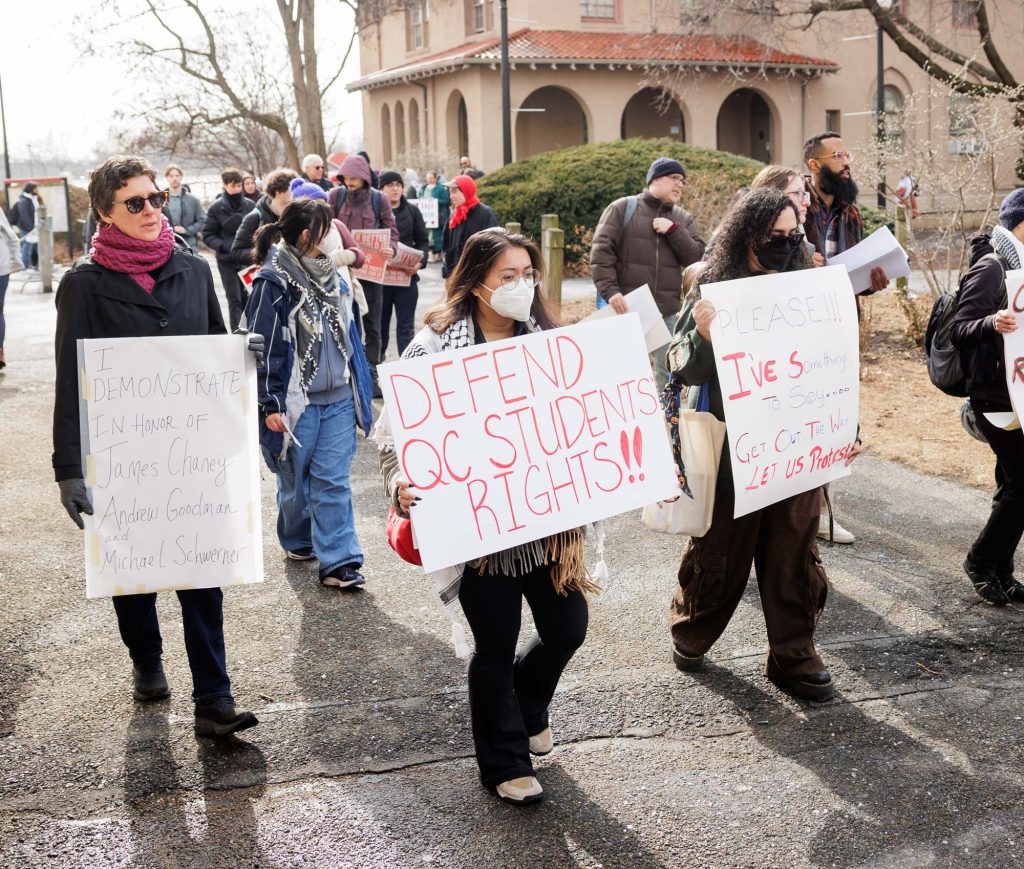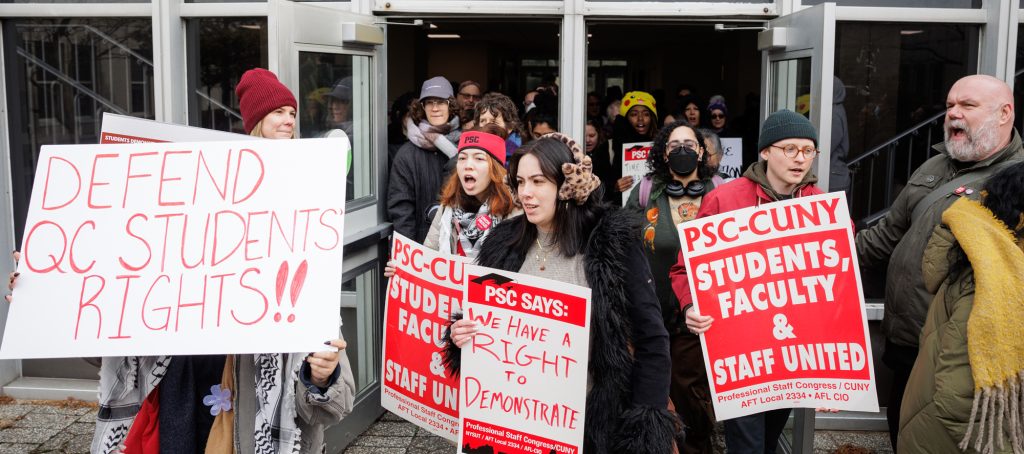More than 100 PSC members and students gathered on February 3 to protest the Queens College administration’s interim policy that limits the time, place and number of campus demonstrations, which the union has called a violation of free expression. The new policy, handed down suddenly, forbids indoor demonstrations and requires a request for permission with at least three days’ advance notice. The policy also limits protest to five locations on campus.
The new order means business: The administration said violation of these policies was grounds for disciplinary action.

David Gerwin, chair of the secondary education and youth services department at Queens College. (Credit: Paul Frangipane)
“The interim guidelines violate the spirit of Queens College’s oft-repeated motto, Discimus ut serviamus: We learn so that we may serve,” said Karen Sullivan, co-chair of the Queens College PSC chapter. “They violate Queens College’s well-known tradition of fighting injustice and serving our communities – on campus, in Queens, in NYC, nation-wide and internationally. Now, more than ever, the Queens College community – students, faculty, staff and administration, must continue to resist forcefully against restrictions on our ability to speak out in support of the most vulnerable among us.”
ORGANIZING
The protest showed that the Queens College community is organizing to defend academic freedom and freedom of expression. The Queens demonstration comes after months of the PSC fighting, and often winning, against administration decisions that have violated free speech and academic freedom on several campuses.
Below are letters from the chapter to and from Anthony Alessandrini, the chair of the union’s academic freedom committee, to QC President Frank Wu.
From the QC Chapter:
We write to ask that you immediately withdraw the “Interim Queens College Guidance Regarding Time, Place,and Manner Regulations for Demonstrations on Campus.” As an initial matter, this guidance is unnecessary, as the City University of New York’s Henderson Rules already govern the campus conduct it addresses. Indeed, it is debatable whether these restrictions are even permissible under the Henderson Rules.

Faculty, staff and students protest restrictions on campus protests. (Credit: Paul Frangipane)
The interim guidance impermissibly and arbitrarily constrains free speech rights on our campus by requiring advance approval, thus stifling spontaneous demonstrations by Queens College community members, limiting the locations of protests, thus isolating protests from their audiences, and excluding community voices from the decision-making process. Regardless of intent, its provisions would likely have a discriminatory impact, limiting the ability of already marginalized individuals and groups to make their voices heard. Our campus should be a haven of peaceful expression and academic freedom, not an unwelcoming, repressive institution that dedicates its resources to silencing dissent.
The following addresses just a few of the “time, place and manner regulations” to which we object.
- “Organizers of Demonstrations must . . . complete the Campus Events Request Form, and submit it . . . at least three business days before the planned Demonstration date for consideration.”
This requirement for advance approval is antithetical to First Amendment rights and principles of academic freedom. A key component of free speech in general, and as historically exercised at CUNY, is the ability to engage in spontaneous expression, to immediately respond to breaking news and developing events. Requirements for advance permission not only constitute an unacceptable restriction on our First Amendment rights, but also undermine our mission, as they would disempower our students and erode, rather than build, a sense of community. (We also note that the campus events request form link leads to a login page on the City College website.
- “No Demonstrations are allowed inside College buildings.”
The Henderson rules already establish that “a member of the academic community shall not intentionally obstruct or forcibly prevent others from the exercise of their rights. Nor shall s/he interfere with the institution’s educational processes or facilities.” The added constraint presents a more restrictive limitation and assumes bad faith on the part of the demonstrators.
- “Demonstrators may be requested to remove masks or face coverings, other than those required as accommodations under the Americans with Disabilities Act.”
This provision is highly problematic and has a high likelihood of having a discriminatory and chilling impact. Among other things, many individuals have non-ADA, yet equally valid, reasons (including health concerns and religious practices) for covering their faces. These individuals may be justifiably hesitant to participate in demonstrations for fear of having their other rights (including their First Amendment right to freely practice their religious beliefs) violated.
- “Demonstrations shall not exceed three hours in duration.”
This provision could similarly deny protesters a reasonable opportunity to reach their intended audience, as when a demonstration concerns a campus event that lasts more than three hours. Additionally, this rule could be used to deny interested individuals the opportunity to participate in the demonstration. On a diverse and vibrant campus such as ours, different members of our community move through the college at different times, and a demonstration should have the right to reach a wide audience and allow all who wish to join an opportunity to do so.
- “No Demonstrations during the Reading Period or Final Exam Period.”
Again, the guidelines impermissibly restrict the ability to engage in spontaneous expression and to respond in a timely manner to breaking news and developing events, if these events happen to occur during the proscribed period. This is particularly problematic, as the Reading Period and Final Exam Period are generally the last opportunity many community members have to act collectively on campus before a lengthy break in which many are absent from campus.
- “The College permits approved Demonstrations at the following locations . . . : Student Union Field 1 Parking Lot, Eastern Quad, Central Quad, Western Quad, Dining Hall Plaza. The College may authorize Demonstrations at other locations on Campus only upon written approval of the Vice President of Student Affairs and Enrollment Management.”
This policy contains protests to limited spaces that are isolated from the rest of the campus and would again potentially prevent demonstrators from reaching their intended audience. The Henderson Rules already bar demonstrations from blocking access to college facilities, rendering this further restriction on free speech an excessive overreach.
The interim guidelines are also problematic in that, inter alia, much of the language is excessively vague, which could readily result in unpredictable, inconsistent, inequitable and discriminatory enforcement of these guidelines.
NOT NEUTRAL
While the guidelines are drafted to appear “content-neutral” on their face, their application is likely to be anything but neutral, disproportionately impacting the very people most likely to demonstrate on campus – those who express viewpoints that the college administration opposes. Moreover, the very process of creating these guidelines runs counter to ensuring an inclusive environment, as key segments of the community (including students, faculty, staff and unions) were excluded from the drafting process.
We also note that your administration introduced this overly broad, restrictive and unnecessary interim policy over winter break, when few community members are on campus and many are not focused on campus developments. This continues a disappointing pattern, similar to the actions last January surrounding the “non-reappointment” of 24 full-time faculty members. However, we remain vigilant.
The interim guidance purports that it is: “intended to ensure a welcoming, safe and inclusive environment that supports academic and social activities at Queens College.” In fact, it does the opposite. As noted above, these guidelines not only chill free speech, but also discourage a sense of community on our campus and go against Queens College’s long history as a center for activism – a history symbolized by the Chaney-Goodman-Schwerner Clock Tower and celebrated this month at an event honoring the legacy of Rev. Martin Luther King Jr. Across generations, we have created a legacy of peaceful and impactful activism on our campus, and we should all be proud of this history. We recognize that there may be instances where reasonable restrictions on First Amendment rights could be considered necessary to serve an important government purpose. The restrictions set forth in these interim guidelines are neither reasonable nor necessary, and do not serve any legitimate government purpose.
We therefore again demand immediate withdrawal of this interim policy. Any changes to guidance governing expression on campus should be crafted to impose as few limitations as possible, and in consultation with students, faculty, and staff, to ensure that they reflect the college’s values of equity and inclusivity, principles of academic freedom and proud legacy of activism.
From Alessandrini:
I am writing on behalf of the Professional Staff Congress Academic Freedom Committee. Our charge is to defend academic freedom as a professional and contractual right of all CUNY professional staff. Academic freedom is grounded in the faculty or staff member’s qualifications for the position as reviewed by his/her peers. It consists of the freedom to teach, research, write and to speak in our capacity as citizens without restraint by the administration.
We join with the Queens College PSC Chapter and other PSC members to demand that you immediately withdraw the “Interim Queens College Guidance Regarding Time, Place and Manner Regulations for Demonstrations on Campus.” As the recent letter from PSC members notes, this guidance is unnecessary, since the City University of New York’s Henderson Rules already govern the campus conduct it addresses. Indeed, it is debatable whether these restrictions are even permissible under the Henderson Rules.
REPRESSION

Media from around the city covered the campus protest. (Credit: Paul Frangipane)
Furthermore, given that the opening paragraph states “The Guidance applies to all persons at Queens College, regardless of their affiliation,” it will very clearly have the effect of repressing the contractual academic freedom rights of PSC members, and indeed all members of the Queens College community. We particularly object to the fact that members of the Queens College PSC Chapter were not consulted in the drafting of these guidelines, nor were students and other members of the community whose rights will be affected by these guidelines. These new policies represent a chill on academic freedom, free speech and freedom of assembly that undermines the basic mission of Queens College, and of CUNY as a whole, as an academic institution.
Among other concerns, the interim guidance impermissibly and arbitrarily constrains free speech rights on campus by stifling spontaneous demonstrations by Queens College community members – including PSC members – and by isolating protests from their audiences, thus excluding community voices from the decision-making process. Regardless of intent, its provisions would likely have a discriminatory impact, limiting the ability of individuals and groups to make their voices heard.
In tandem with other PSC members, we offer the following objections in particular to the “time, place and manner regulations”:
- In the most general sense, a key component of free speech and academic freedom is the ability to engage in spontaneous expression, to immediately respond to breaking news and developing events. Requirements for advance permission constitute an unacceptable restriction on PSC members’ First Amendment and academic freedom rights.
- “No Demonstrations are allowed inside College buildings.” This provision could in many instances deny protesters a reasonable opportunity to reach their intended audience, who may be indoors. Moreover, this policy is impermissibly discriminatory against individuals who, for a variety of reasons, cannot fully participate in an event that is held exclusively outdoors. During inclement weather, this provision could stop demonstrations entirely. Additionally, the vague description of “demonstrations” precludes any number of activities that PSC members may deem to be of academic and intellectual value, thus in effect precluding them from doing our work as public educators.
- “Demonstrations shall not exceed three hours in duration.” This provision could similarly deny protesters a reasonable opportunity to reach their intended audience, as when a demonstration concerns a campus event that lasts more than three hours. Additionally, this rule could be used to deny interested individuals the opportunity to participate in the demonstration. A demonstration should have the right to reach a wide audience and allow all who wish to join an opportunity to do so.
- The College permits approved Demonstrations at the following locations, unless another party has previously reserved the space: Student Union Field 1 Parking Lot, Eastern Quad, Central Quad, Western Quad, Dining Hall Plaza. The College may authorize Demonstrations at other locations on Campus only upon written approval of the Vice President of Student Affairs and Enrollment Management.” The Henderson Rules already bar demonstrations from blocking access to college facilities, rendering this further restriction on free speech completely unnecessary. Moreover, this policy contains protests within small spaces that are isolated from the rest of the campus and would again potentially prevent demonstrators from reaching their intended audience.
MASKING ISSUE
Our committee also objects to the ban on protests during finals week, and to asking people to remove a face mask unless they have approved accommodations. The latter point is particularly important, given the PSC’s insistence upon making certain that members who have health conditions be able to work in a safe environment that allows them to protect their health. Additionally, the interim policy’s language around incitement, lawless action, defamation, harassment, threats, damage to college property and “unauthorized markings or attachments” is excessively vague, open to interpretation and invites overreach by CUNY management.
While all of these restrictions are drafted to appear “content-neutral” on their face, their application is likely to be anything but neutral, disproportionately impacting the very people, including PSC members, who are most likely to demonstrate on campus — those who express viewpoints that the college administration opposes. Moreover, the very process of creating these guidelines runs counter to ensuring an inclusive environment, as key segments of the college community (including students, faculty, staff and unions) were excluded from the drafting process.
The interim guidance purports that it is “intended to ensure a welcoming, safe and inclusive environment that supports academic and social activities at Queens College.” In fact, it does the opposite. As noted above, these guidelines chill academic freedom and free speech in a manner that undermines both the academic mission of Queens College and the contractual academic freedom rights of PSC members. We therefore demand the immediate withdrawal of this interim policy. Any subsequent changes to guidance governing expression on campus, if and when these are deemed by the Queens College community to be necessary, should be crafted in the least restrictive way possible, and in consultation with students, faculty and staff – and, in particular, with members of the Queens College PSC Chapter.

